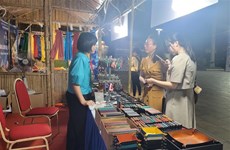Vietnam takes care of children with disabilities
Vietnam has over 1.2 million disabled children, including those affected
by the aftermaths of war, especially toxic chemicals, bombs, mines and
explosive remnants. It poses a great challenge to the country in
ensuring their rights and helping them integrate into society.
Vietnam has over 1.2 million disabled children, including those affected
by the aftermaths of war, especially toxic chemicals, bombs, mines and
explosive remnants. It poses a great challenge to the country in
ensuring their rights and helping them integrate into society.
According to the Ministry of Labour, War Invalids and Social Affairs (MOLISA), disabled children account for 86 percent of all the children who need special care in the country.
Children with disabilities face various difficulties, such as poor access to education and health care services.
Discrimination is another challenge. They have fewer opportunities to go to school due to discrimination and the limited skills of educational managers and teachers.
According to the 2009 Vietnam Population and Housing Census , only 66.5 percent of primary school-age children with disabilities go to school, compared to 97 percent among normal peers. The rate of literacy among people with disabilities in the 15-24 age group was only 69.1 percent, much lower than the rate of 97.1 percent among normal people.
Vietnam is also short of trained social officials as well as community-based support services for disabled children.
In a bid to better care for and protection of children with disabilities, the country has exerted efforts to put in place a legal framework.
Vietnam signed the UN Convention on the Rights of Persons with Disabilities in 2007 and is expected to ratify the convention early next year.
In June 2010, the country passed its own Law on Persons with Disabilities , which reflects Vietnam’s legal progress in protecting the rights of disabled children in line with the UN Convention on the Rights of Persons with Disabilities .
The law also enables disabled children to access social welfare, comprehensive education and health care services, as well as improves the quality of childcare centres while encouraging home- and community-based childcare.
Vietnam ’s Government also pledges to offer educational services to children with disabilities, making efforts to improve their rehabilitation as well as helping them integrate into society.
The United Nations Children’s Fund (UNICEF) has provided essential assistance for Vietnam to devise laws and suitable policies for children, especially those with disabilities, over the past years.
Since 2008, the two sides have established a comprehensive programme focusing on bettering policies and legal frameworks to aid children with disabilities.
The programme, which operates at both national and provincial levels, also looks to raise relevant sides’ awareness of the rights and needs of disabled children to meet their specific demands.
In terms of legal aid, the fund has helped the country devise the law and sub-law documents relating to people with disabilities, as well as in preparations to ratify the UN Convention on the Rights of Persons with Disabilities by 2014.
Meanwhile, education campaigns under the programme helped enhance officials and activists’ knowledge and skills to better ensure disabled children’s rights and meet their needs.
UNICEF also assisted Vietnam in building provincial-level action plans and a comprehensive framework to direct domestic and foreign partners in the field.
In addition, the programme helped set up a model of comprehensive child care integrating health and education services designed specially to facilitate disabled children’s community integration.
Recently, UNICEF has coordinated with the Association of Agent Orange/dioxin Victims in central city of Da Nang to set up a daycare centre for disabled children in Hoa Vang district. The model will be multiplied in other areas nationwide.
A support centre for integrated education has also been established in Da Nang with UNICEF’s technical and financial aid, in implementing the country’s commitment to help disabled children access general education.-VNA
According to the Ministry of Labour, War Invalids and Social Affairs (MOLISA), disabled children account for 86 percent of all the children who need special care in the country.
Children with disabilities face various difficulties, such as poor access to education and health care services.
Discrimination is another challenge. They have fewer opportunities to go to school due to discrimination and the limited skills of educational managers and teachers.
According to the 2009 Vietnam Population and Housing Census , only 66.5 percent of primary school-age children with disabilities go to school, compared to 97 percent among normal peers. The rate of literacy among people with disabilities in the 15-24 age group was only 69.1 percent, much lower than the rate of 97.1 percent among normal people.
Vietnam is also short of trained social officials as well as community-based support services for disabled children.
In a bid to better care for and protection of children with disabilities, the country has exerted efforts to put in place a legal framework.
Vietnam signed the UN Convention on the Rights of Persons with Disabilities in 2007 and is expected to ratify the convention early next year.
In June 2010, the country passed its own Law on Persons with Disabilities , which reflects Vietnam’s legal progress in protecting the rights of disabled children in line with the UN Convention on the Rights of Persons with Disabilities .
The law also enables disabled children to access social welfare, comprehensive education and health care services, as well as improves the quality of childcare centres while encouraging home- and community-based childcare.
Vietnam ’s Government also pledges to offer educational services to children with disabilities, making efforts to improve their rehabilitation as well as helping them integrate into society.
The United Nations Children’s Fund (UNICEF) has provided essential assistance for Vietnam to devise laws and suitable policies for children, especially those with disabilities, over the past years.
Since 2008, the two sides have established a comprehensive programme focusing on bettering policies and legal frameworks to aid children with disabilities.
The programme, which operates at both national and provincial levels, also looks to raise relevant sides’ awareness of the rights and needs of disabled children to meet their specific demands.
In terms of legal aid, the fund has helped the country devise the law and sub-law documents relating to people with disabilities, as well as in preparations to ratify the UN Convention on the Rights of Persons with Disabilities by 2014.
Meanwhile, education campaigns under the programme helped enhance officials and activists’ knowledge and skills to better ensure disabled children’s rights and meet their needs.
UNICEF also assisted Vietnam in building provincial-level action plans and a comprehensive framework to direct domestic and foreign partners in the field.
In addition, the programme helped set up a model of comprehensive child care integrating health and education services designed specially to facilitate disabled children’s community integration.
Recently, UNICEF has coordinated with the Association of Agent Orange/dioxin Victims in central city of Da Nang to set up a daycare centre for disabled children in Hoa Vang district. The model will be multiplied in other areas nationwide.
A support centre for integrated education has also been established in Da Nang with UNICEF’s technical and financial aid, in implementing the country’s commitment to help disabled children access general education.-VNA













